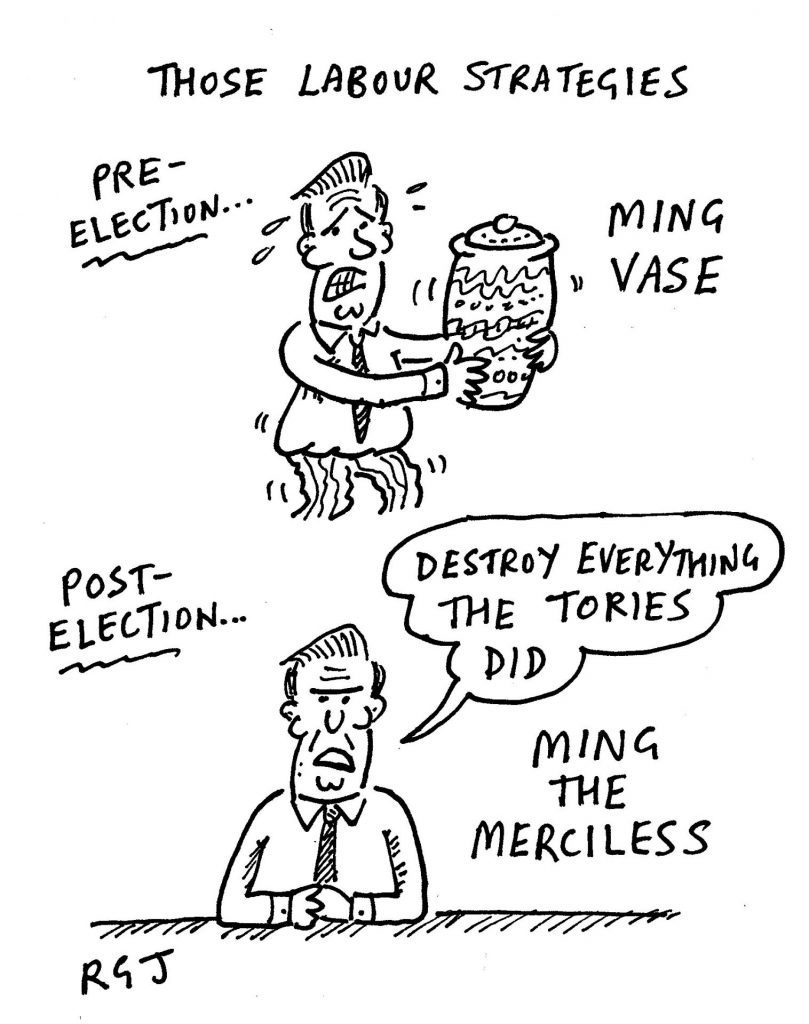Three years off 70, I was quite proud of myself, managing an all-nighter. My last one was to follow the US presidential election which saw Joe Biden beat Donald Trump. Then, I had the advantage of being on a sofa at home; this time I was in a TV studio having to keep concentration, research and react as the Tories were being swept from power, and deal with an ever-changing carousel of guests from across the political spectrum.
After completing the 11-hour slot for Channel 4, with a half-hour break only to record a 3am podcast, I remembered I had promised Sophie Raworth a stint on the BBC. After recording the second podcast of the night, I legged it from Channel 4’s studio in Hammersmith to Parliament’s College Green, arriving just as Rishi Sunak was about to leave Downing Street. History.
And, having said many harsh things about him, may I say I thought he spoke well, his kind words about Keir Starmer an important part of the seamless transition of power which stood in such contrast to the Trumpian nightmare which accompanied my last self-enforced sleepless night.
I had also promised a few foreign channels a turn, and Channel 4 News another double act with David Cameron’s former director of communications, Craig Oliver, at 7pm. So by the time I got to bed, around 9.30pm on Friday night, unable to stay awake for the France v Portugal penalties, I had managed 40 minutes’ back-of-car sleep in two days. This is not healthy.
But it was worth it, to be awake for the news of every single Tory loss. Liz Truss was an especially delicious moment, voters making clear that if you do so much harm, and show zero contrition, you will pay a price.
By Saturday morning, I was exhausted, but determined to get back to my routine of a 7am swim, where lots of friendly faces, including a member of Jeremy Corbyn’s team, seemed to share my delight that the Tories were out and local MP Keir Starmer was in. The chat that meant the most was with Jason, a lido regular who runs his own successful business, has voted Tory all his life, but had for the first time voted Labour, partly, he said, through listening to me in the queue, the water and the changing room, and even more so on the Rest Is Politics.
“So how does it feel, having been part of the change?” I asked. “Feels great,” he smiled. “Very happy with it.”
He went on to say something which I think could explain why – and here I am in prediction mode – Labour and Keir Starmer will rise in the polls in the early stages of the new government.
“I watched his speech in Downing Street,” Jason said. “It was amazing how much stronger and more confident he looked than during the campaign. It was like he had already grown into the job.”
Partly that is the power of the office. But it is also that Starmer is very much a creature of government, not opposition. I have seen him many times during his nine years as an MP, and often been struck by a sense of frustration, which during the Corbyn years grew closer to exasperation, that he had gone into politics in his 50s, and risked being an opposition MP for his entire career. Let’s not forget that in the wake of the 2019 defeat, many felt Labour faced an existential threat.
Opposition really didn’t suit Starmer. The sense Jason was reflecting is that government does.
The challenges he faces are enormous. But he begins the task not just with a clear mandate and big majority, but with considerable goodwill, and a life story which has always been about delivering more than anyone ever expected him to. Here’s hoping that pattern continues.

There was no day one Bank of England independence equivalent, the change Gordon Brown announced as Labour took power in 1997. But to those of us who have long argued for prison reform, the appointment of businessman James Timpson to a peerage to become minister of prisons, parole and probation got close.
This is a man who has done very well in life, but devoted much of his time, energy and resources to helping those who have done less well, including prisoners. He has made a practice of hiring former prisoners to his business, is ex-chair of the Employers Forum for Reducing Re-offending and chair of the Prison Reform Trust. He founded the Employment Advisory Board network, which links prisons with employers to improve employment opportunities for ex-offenders on release.
All of which suggests a new and more enlightened approach to prisons, with the focus less on banging people up in horrific conditions, and more on prevention and rehabilitation.
Our prisons are a disgrace. So, all too often, is our attitude to crime and punishment. This appointment of a man who has long believed so, and said so when it was deeply unfashionable, was in its own way as heartening as the election result itself.
Amid the Tories who went was justice secretary Alex Chalk, the only serving member of the Tory cabinet who agreed to be interviewed by me and Rory Stewart during the campaign. We had in fact arranged to do the interview in a prison, with an audience of prisoners, but election purdah meant that couldn’t happen. He nonetheless kept to his commitment to appear on the podcast.
It is worth remembering that among those who lost their seats were some good, decent people who, while having different views to mine, I recognise as having gone into politics for the right reasons. And PS, I hope James Timpson will agree to the same in-prison format for a future podcast chat.
As for Nadine Dorries… my God. Would she ever have been a cabinet minister in a government led by anyone other than Boris Johnson? I am a big believer in loyalty, but surely there are limits?
She came from a genuinely working-class background, yet such is her blind support of one of the two worst PMs in history that in one of her spells on Channel 4, she maintained that he too came from a background of struggle. Her reasoning… he needed a scholarship to get to Eton. Fellow Etonian Rory Stewart spluttered into the green tea that was keeping him going, asking how all Johnson’s brothers managed to get there too?
Then there is her fact-bending “what about Iraq?” refusal to accept that Johnson ever lied, and her assumption that because he won an election in 2019, he would have done so again now. No wonder a member of the live audience called her “deluded.”
I was being texted from far and wide “don’t let her wind you up”, and once she had responded to my plea that “you really do need to get over Boris Johnson” with the accusation that this was a sexist remark, that task became easier.
There comes a point where you just stop taking unserious people seriously at all, and move on. I hope our broadcasters are capable of the same approach now the Tory psychodrama and its cast of wacky characters are history.
I have just arrived in Istanbul, where the papers are full of the grief which accompanies defeat in a major football tournament, with Turkey having been knocked out by the Netherlands.
But the Turk who sat alongside me en route at least retained sufficient humour to point out that (at the time of writing at least) England have a 100% penalty shoot-out record under Labour. Good stat.




